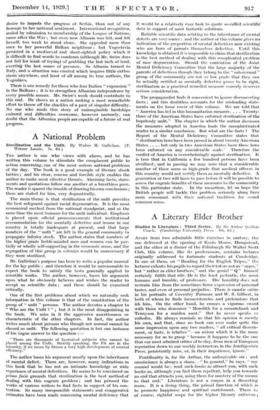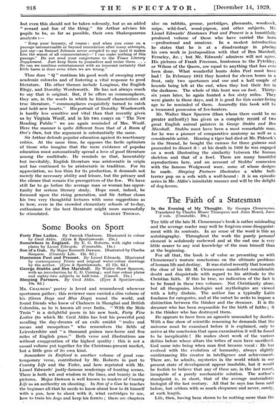A Literary Elder Brother
APART from two- admirable little exercises in oratory, the one delivered at the opening of Keats House, Hampstead, and the other at a dinner of the Edinburgh Sir Walter Scott Club, this volume, like its predecessors, contains lectures originally addressed to fortunate students at Cambridge. In one of them, on " Reading for the English Tripos," the lecturer exhorts his pupils to regard their tutors not as sages," but " rather as elder brothers," and the genial " Q " himself certainly fulfils that role. He is the least pedantic, the most humane and humble, of professors. - His- humility does not restrain him from the sometimes fierce expression of personal tastes, and even of personal prejudice. There is caustic satire in his portraits of Coventry Patmore and W. S. Gilbert, in both of whom he finds inconsistencies and pretensions that irk him. On the other hand, he crosses a vigorous sword with thcise who denounce " Meredith for a mountebank and Tennyson for a maiden aunt." But he never speaks ex cathedra. He always reminds us that his opinion is merely his own, and that, since no book can ever make quite the same impression upon any two readers, " all critical discern- ment, or taste, is relative "—an axiom which it is the more necessary for us to grasp " because it happens to be the one that our most admired critics of to-day, from men of European reputation down to our weekly instructors in the Intelligentsia Press, persistently miss, or, in their impatience, ignore."
Pontificality is, for Sir. Arthur, the unforgivable sin ; and omniscience it always a sham. , " In general,'' he _Says, " my counsel would be : read such books as attract you, with such books as, although you find them repellent, help you towards an end that attracts you, using them for mastery of the means to that end." Literature is not a corpse in a dissecting room. It is a living thing, the primal function of which is to promote happiness and spiritual enrichment. There is, of course, rightful scope for the higher literary criticism ; but even this should not be taken solemnly, but as an added " reward and fun of the thing." Sir Arthur advises his pupils to be, so far as possible, their own Shakespearean analysts :—
" Keep your honesty, of course : and when you come on a passage unconstruable or beyond emendation-after many attempts, just say—as Samuel Johnson never scrupled to say (and it makes him the wisest of all commentators)—` I can make nothing of this passage.' Do not send your conjectures to the Times Literary Supplement. Just keep them to yourselves and revise them. . . . So can we combine entertainment with an innocent certainty that little harm is done even when we are wrong."
Thus does " Q " continue his good work of sweeping away academic cobwebs and of fostering a vital response to good literature. His other themes include Longinus, the English Elegy, and Dorothy Wordsworth. He has not always much to say that is original. But, if he offers us commonplaces, they are, in the words in which he himself characterizes all true literature, " commonplaces exquisitely turned to catch and hold new hearts." His portrait of Dorothy Wordsworth is hardly less sensitive and vital than that recently given us by Virginia Woolf, and in his two essays on " The New
Reading Public " we are again reminded of Mrs. Woolf. Here the manner is quite different from that of A Room of One's Own, but the argument is substantially the same.
Sir Arthur defends popular education against its reactionary critics. At the same time, he opposes the facile optimism of those who imagine that the mere existence of popular education must automatically spread a love of good literature among the multitude. He reminds us that, lamentably
but inevitably, English literature was aristocratic in origin and has continued to be aristocratic in tradition. For its
appreciation, no less than for its production, it demands not merely the necessary ability and leisure, but the privacy and the silence that remain the prerogatives of the few. We have still far to go before the average man or woman has oppor- tunity for serious literary study. Hope must, indeed, be focussed upon the rising generation, and Sir Arthur closes his two very thoughtful lectures with some suggestions as to how, even in the crowded elementary schools of to-day, enthusiasm for the best literature might more successfully













































 Previous page
Previous page